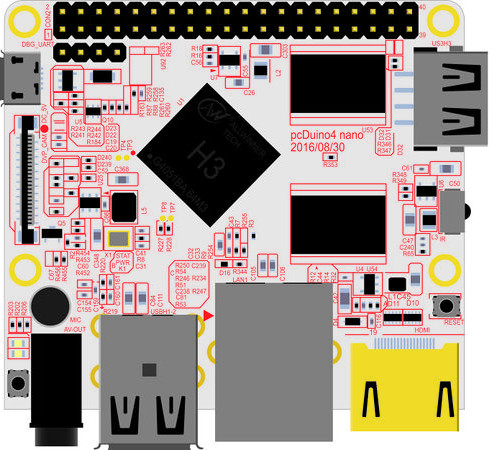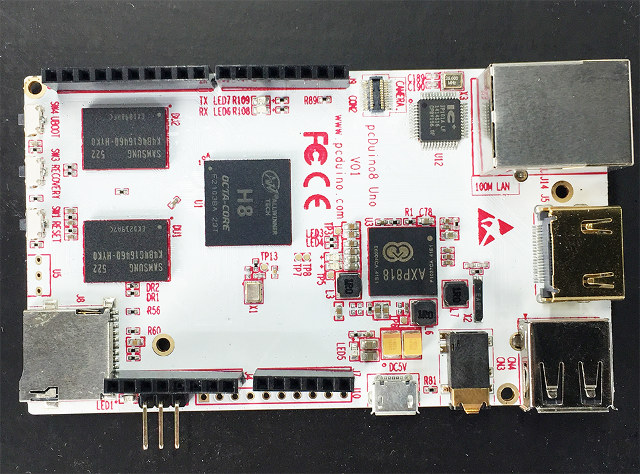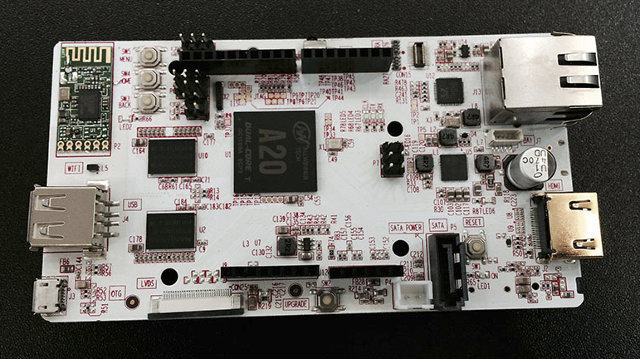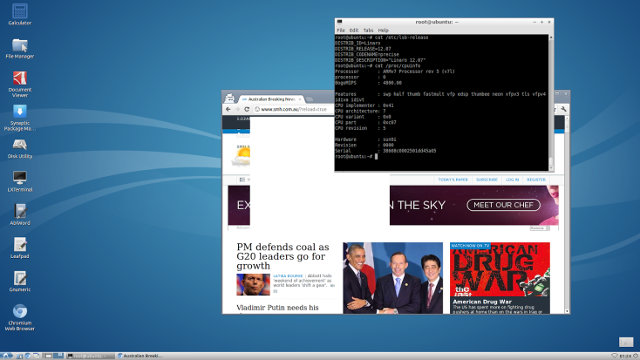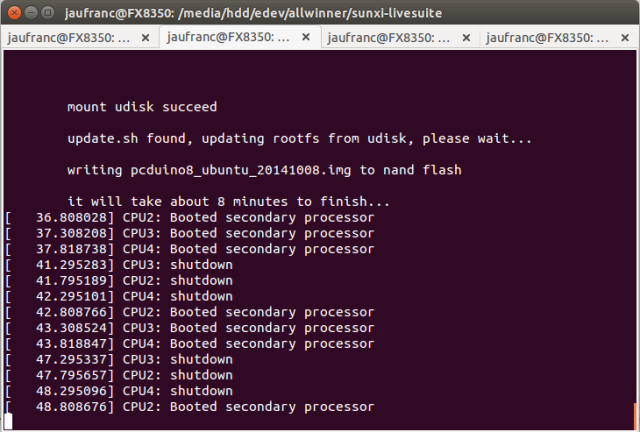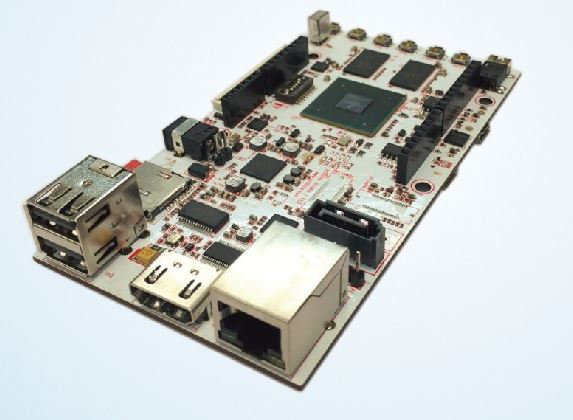We already have plenty of low cost Allwinner H3 development boards thanks to several Shenzhen Xunlong Orange Pi boards and FriendlyARM NanoPi boards among a few others. Here comes another one with pcDuino4 Nano. pcDuino4 Nano (preliminary?) specifications: SoC – Allwinner H3 quad core Cortex A7 @ 1.2 GHz with an ARM Mali-400MP2 GPU up to 600 MHz System Memory – 1GB DDR3 SDRAM Storage – micro SD card slot Video & Audio Output – HDMI and 3.5mm jack for CVBS (composite + stereo audio) Connectivity – 10/100M Ethernet USB – 3x USB 2.0 host ports, 1x micro USB OTG port Camera – DVP Interface Expansions – 40-pin Raspberry Pi compatible header with UART, SPI, I2C, PWM, GPIOs, etc… Debugging – 4-pin header for serial console Misc – Power and reset buttons; 2x LEDs; IR receiver; on-board microphone. Power Supply – 5V/2A via micro USB port; 5V via VDD_5V pin […]
$15 pcDuino3 Nano Lite Board Includes Gigabit Ethernet and a Real SATA Port
I often read people complain about the lack of SATA and Gigabit Ethernet on devices, and following up a discussion on a recent post about QNAP TAS-168 and TAS-268 NAS, I was made aware that pcDuino3 Nano board had a little brother without NAND Flash, nor an IR receiver that’s currently selling for $15 on Amazon US. pcDuino3 Nano Lite board specifications are exactly the same as the other version minus the stricken-through items: SoC – AllWinner A20 dual core ARM Cortex A7 @ 1.0 GHz with Mali 400MP2 GPU System Memory – 1GB DRAM Storage – 4GB NAND Flash, SATA connector and microSD card slot (up to 32GB) Video Output – HDMI 1.4 with HDCP support Audio Out – 3.5mm analog audio interface Connectivity – Gigabit Ethernet USB – 2x USB host, 1x USB OTG Expansion Headers – Arduino UNO extension interface with 14xGPIO, 2xPWM, 6xADC, 1xUART, 1xSPI, 1xI2C. […]
pcDuino8 Uno is an Allwinner H8 Octa-core Development Board with Arduino Headers
H7 Hummingbird development board powered by Allwinner H8 octa-core Cortex A7 processor with support for 1080p H265 video decoding launched this summer, but Merrii does not usually provide much support to individual developers. Linksprite is about to launch a new H8 development board that also comes with Arduino compatible headers. pcDuino8 Uno board specifications: SoC – AllWinner H8 octa-core ARM Cortex-A7 processor @ up to 2.0GHz with PowerVR SGX544 GPU @ up to 700MHz System Memory – 1GB DDR3 Storage – micro SD card slot up to 32GB Video Output – HDMI 1.4 up to 1080p with HDCP support Audio I/O – HDMI, 3.5mm analog audio jack Connectivity – Ethernet (100M LAN shown on board, but “Gbps” listed in specs) USB – 1x USB 2.0 host port, 2x micro USB ports (1x OTG, 1x power only) Camera – 1x MIPI CSI header Expansion Headers – Arduino Uno headers with 14x […]
pcDuino3B Development Board Adds Gigabit Ethernet Support
pcDuino3 development board features Allwinner A20 dual core Cortex A7 SoC with support for SATA, HDMI, LVDS, Wi-Fi, Fast Ethernet, and Arduino compatible headers. Linksprite has now an updated version of the board that adds Gigabit Ethernet, while leaving the rest of the specs unmodified. pcDuino3B (aka pcDuino V3B) specifications: SoC – AllWinner A20 dual core ARM Cortex A7 @ 1.0 GHz, with Mali 400MP2 GPU System Memory – 1GB DRAM Storage – 4GB NAND Flash, SATA connector, and microSD card slot (up to 32GB) Video Output – HDMI 1.4 with HDCP support, LVDS header Audio Out – 3.5mm analog audio interface, I2S stereo digital audio interface Connectivity – Gigabit Ethernet, 802.11 b/g/n WiFi USB – 1x USB host, 1x USB OTG Expansion Headers – Arduino UNO extension interface with 14xGPIO, 2xPWM, 6xADC, 1xUART, 1xSPI, 1xI2C. Camera – MIPI camera support Misc – IR receiver Power – 5V, 2000mA, support […]
How-to Install Ubuntu on Allwinner A80 Powered pcDuino8 and A80 OptimusBoard
Last month, pcDuino released Android 4.4 and Ubuntu images for pcDuino8 board powered by Allwinner A80 octa core processor, and since it’s the same board layout as A80 OptimusBoard, I decided to try it out, but it failed as the update script would try to flash it to a partition that’s too small for the root file systems. But last week, Ian Morrison and Minidodes gave it another try, and successfully booted Ubuntu, or more exactly Lubuntu, on A80 OptimusBoard. Both their screenshot reports sun9i platform in /proc/cpuinfo, so that’s definitely Allwinner A80, but only one core is shown. I’m not sure if it’s because the other are idled and don’t show, or for some reasons, the kernel only supports one core at this stage. Anyway, here’s how they did to install Lubuntu: Flash the kernel (pcduino8_kernel_livesuit_20141008.img) with PhoenixCard or Livesuit first. See instructions to use Livesuit with A80 OptimusBoard. […]
Updated Android 4.4 Beta and Ubuntu Images for pcDuino8 / A80 OptimusBoard Boards Released
pcDuino8 and A80 OptimusBoard are the only two Allwinner A80 development boards currently “somewhat” available, and albeit the PCB color is different, every else is basically identical, and pcDuino8 firmware should probably run on A80 OptimusBoard and vice versa. If you own any of these boards, you may interested in two images, one with Android 4.4 (beta), and one with Lubuntu, recently released by pcDuino / Linksprite. Android 4.4 (beta) 2014-10-08 – sun9iw1p1_android_optimus.img to be flashed with PhoenixCard (Windows) or Livesuit (Linux) Lubuntu 14.04? 2014-10-08 is comprised of two files: Kernel – pcduino8_kernel_livesuit_20141008.img to be flashed with PhoenixCard or Livesuit first. See instructions to use Livesuit with A80 OptimusBoard. Rootfs – pcduino8_ubuntu_20141008.rar. First extract the rar files to the root of an SD card or USB flash drive. There should be two files: pcduino8_ubuntu_20141008.img and update.sh. Now connect the mass storage device to pcDuino3 / A80 Optimusboard, and reboot the […]
Linux 3.17 Released
Linus Torvalds announced the release of Linux Kernel 3.17 on Sunday: So the past week was fairly calm, and so I have no qualms about releasing 3.17 on the normal schedule (as opposed to the optimistic “maybe I can release it one week early” schedule that was not to be). However, I now have travel coming up – something I hoped to avoid when I was hoping for releasing early. Which means that while 3.17 is out, I’m not going to be merging stuff very actively next week, and the week after that is LinuxCon EU… What that means is that depending on how you want to see it, the 3.18 merge window will either be three weeks, or alternatively just have a rather slow start. I don’t mind getting pull requests starting now (in fact, I have a couple already pending in my inbox), but I likely won’t start processing […]
pcDuino Acadia 1 is a Freescale i.MX6 Quad Development Board with Arduino Headers
Linksprite has been pretty busy recently. After announcing the $39 pcDuino3 Nano, they’ve now unveiled a new board named pcDuino Acadia 1 powered by Freescale i.MX6 Quad processor with 1GB RAM, 8GB eMMC, a few common ports, and Arduino headers in order to connect Arduino shields to their Linux/Android board. pcDuino Acadia 1 (preliminary) specifications: SoC – Freescale i.MX6 Quad with four ARM Cortex A9 cores up to 1.2GHz, and Vivante GC2000 GPU with support for OpenGL/ES 2. x, OpenCL EP support, and OpenVG 1.1. System Memory – 1GB DRAM Storage – 8GB eMMC, 2x micro SD card slots (up to 128GB), and SATA Video Output – HDMI 1.4 with HDCP support, LVDS Audio Output – 3.5mm analog audio interface Camera – 1x MIPI, 1x CSI Connectivity – 10/100/1000Mbps Ethernet (limited to 470Mbps) USB – 2x USB 2.0 host ports, 1x micro USB OTG Expansion Headers – Arduino UNO compatible […]


